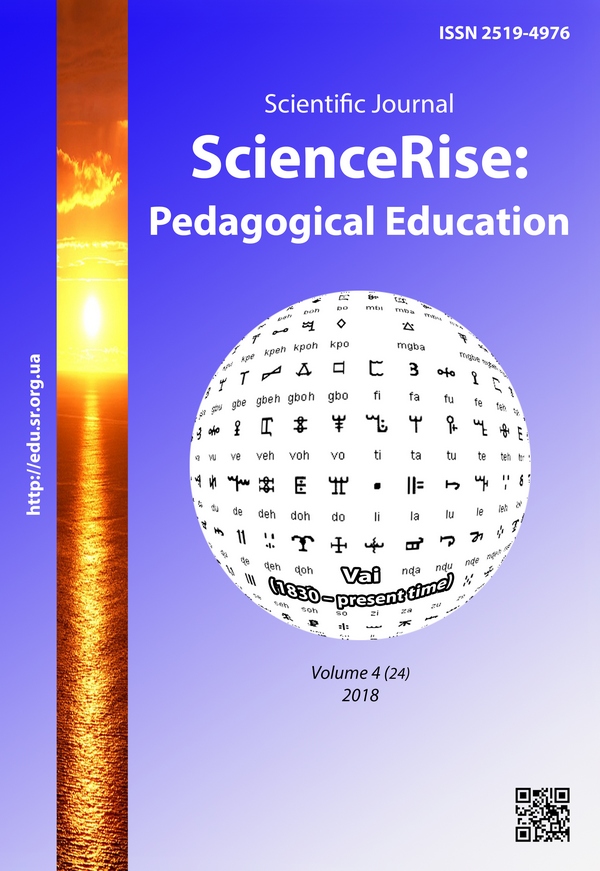Improvement of qualification of managing, pedagogical and scientific-pedagogical workers by the accumulating system: answer to challenges of modernity
DOI:
https://doi.org/10.15587/2519-4984.2018.132534Keywords:
qualification improvement, accumulating system of educational process organization, approaches, principles, competencesAbstract
There is elucidated the urgent problem of organization of increasing the qualification of educational workers corresponding to requirements of the Law of Ukraine “On education”, Conception “New Ukrainian school” and time challenges. There is analyzed the prospective foreign and native experience of the continuous professional improvement of aforesaid workers, based on accumulating systems.
The notion “accumulating system of educational process organization” is defined as a totality of mutually coordinated content, organizational and technological components of improving the qualification that provide constructing individual educational trajectories of the professional-personal development of specialists corresponding to own needs, their realization, recognition and addition of results.
The qualification improvement is grounded by the accumulating system of educational process organization in SHEI “University of educational management” that is embodied in the correspondent normative document of the institution. There is considered the theoretical background of the qualification improvement by the accumulating system that includes the scientific approaches (system, synergetic, personally-oriented, competence) and principles (continuousness; open education; diversification; module character of constructing a content of improving the qualification; European credit-transfer system; correspondence between the content and individual needs and demands of a person, level of the professional competence and so on). Attention is accented on the list of competences as a base of assessing/recognizing of results of teaching students.
Peculiarities of organizational models of improving the qualification of educational workers are characterized according to this system, especially: staged mastering no less than five competences, mastering separate competences, distant additional study, verification of results of teaching students, acquired at other institutions/organizations or by informal education.
In further studies there is provided to probate the qualification improvement by the accumulating system in SHEI “University of educational management” and to assess its effectiveness
References
- Pro оsvitu (2017). Zakon Ukrayiny 5.09.2017. No. 2145-VIII. Available at: http://zakon2.rada.gov.ua/laws/show/2145-19
- Gryschenkо, М. (Ed.) (2016). Nova shckola. Prostir оsvitnih mоzshlyvosyey. Kyiv, 40.
- Oliinyk, V. V. (2009). Pidvyshchennia kvalifikatsii pratsivnykiv proftekhosvity: kontseptualni ta orhanizatsiino-metodychni zasady. Kyiv, 88.
- Chicherina, N. V., Zaytsevskaya, A. A. (2016). Modul'no-nakopitel'naya sistema povysheniya kvalifikatsii sotrudnikov universiteta. Vysshee obrazovanie v Rossii, 6, 34–41.
- Korshunov, I. A., Gaponova, O. S. (2017). Nepreryvnoe obrazovanie vzroslykh v kontekste ekonomicheskogo razvitiya i kachestva gosudarstvennogo upravleniya. Voprosy obrazovaniya, 4, 36–59.
- Mukhlaeva, T. V. (2010). Mezhdunarodnyy opyt neformal'nogo obrazovaniya. Chelovek i obrazovanie, 4, 158–162.
- Litvinova, N. P. (2011). Ideya vauchera v obrazovanii vzroslykh: otechestvennyy i zarubezhnyy opyt. Chelovek i obrazovanie, 4 (29), 49–53.
- Koroleva, E. G. (2013). Sotsial'no-pedagogicheskie problemy diversifikatsii obrazovaniya vzroslykh. Chelovek i obrazovanie, 2 (35), 113–116.
- Lukianova, L. (2017). Zakonodavche zabezpechennia osvity doroslykh: zarubizhnyi dosvid. Kyiv: TOV «DKS-Tsentr», 147.
- Hanushek, E. A., Woessmann, L. (2007). The Role of Education Quality for Economic Growth. Policy Research Working Paper. No. 4122. Washington: World Bank. Available at: https://openknowledge.worldbank.org/handle/10986/7154
- Borevskaya, N. E. (2003). Gosudarstvo i shkola: opyt Kitaya na poroge III tysyacheletiya. Moscow: Vost. lit., 271.
- Hamaniuk, V. A. (1995). Systema pidhotovky pedahohichnykh kadriv ta pidvyshchennia yikh kvalifikatsii u Nimechchyni. Kyiv, 221.
- Polozhenie o nakopitel'noy sisteme povysheniya kvalifikatsii pedagogicheskikh kadrov Sankt-Peterburga (2007). rasporyazhenie Komiteta po obrazovaniyu Sankt-Peterburga 1.02.2007. No. 100-r. Available at: https://www.gov.spb.ru/law?d&nd=8409302&prevDoc=8444988&mark=00000000000000000000000000000000000000000000000000QLQPAM#I0
- Model' Federal'no-regional'noy sistemy professional'noy perepodgotovki i povysheniya kvalifikatsii rabotnikov uchrezhdeniy obshhego obrazovaniya: proekt. Available at: www.eurekanet.ru/res_ru/0_hfile_1935_1.doc
- Pokroieva, L. (2008). Prohramno-tsilovyi pilotnyi proekt Kharkivskoho oblasnoho naukovo-metodychnoho instytutu bezperervnoi osvity «Stvorennia systemy bezperervnoho pidvyshchennia kvalifikatsii pedahohichnykh pratsivnykiv». Pisliadyplomna osvita v Ukraini, 1, 89–90.
- Pidvyshchennia kvalifikatsii pedahohichnykh pratsivnykiv mista Kyieva. Instytut pisliadyplomnoi pedahohichnoi osvity Kyivskoho universytetu im. Borysa Hrinchenka. Available at: http://ippo.kubg.edu.ua/kursi/
Downloads
Published
How to Cite
Issue
Section
License
Copyright (c) 2018 Larysa Olifira

This work is licensed under a Creative Commons Attribution 4.0 International License.
Our journal abides by the Creative Commons CC BY copyright rights and permissions for open access journals.
Authors, who are published in this journal, agree to the following conditions:
1. The authors reserve the right to authorship of the work and pass the first publication right of this work to the journal under the terms of a Creative Commons CC BY, which allows others to freely distribute the published research with the obligatory reference to the authors of the original work and the first publication of the work in this journal.
2. The authors have the right to conclude separate supplement agreements that relate to non-exclusive work distribution in the form in which it has been published by the journal (for example, to upload the work to the online storage of the journal or publish it as part of a monograph), provided that the reference to the first publication of the work in this journal is included.







